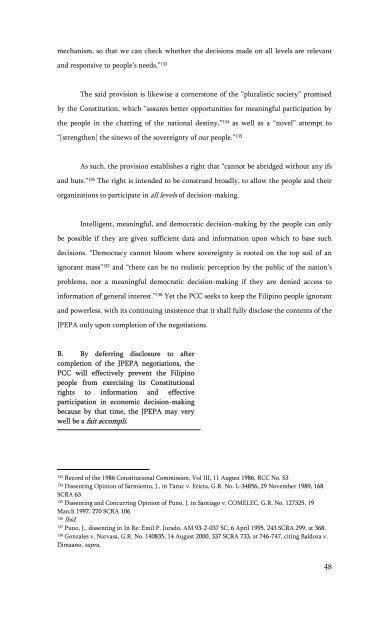here - Philippine Center for Investigative Journalism
here - Philippine Center for Investigative Journalism
here - Philippine Center for Investigative Journalism
You also want an ePaper? Increase the reach of your titles
YUMPU automatically turns print PDFs into web optimized ePapers that Google loves.
mechanism, so that we can check whether the decisions made on all levels are relevant<br />
and responsive to people’s needs.” 133<br />
The said provision is likewise a cornerstone of the “pluralistic society” promised<br />
by the Constitution, which “assures better opportunities <strong>for</strong> meaningful participation by<br />
the people in the charting of the national destiny,” 134 as well as a “novel” attempt to<br />
“[strengthen] the sinews of the sovereignty of our people.” 135<br />
As such, the provision establishes a right that “cannot be abridged without any ifs<br />
and buts.” 136 The right is intended to be construed broadly, to allow the people and their<br />
organizations to participate in all levels of decision-making.<br />
Intelligent, meaningful, and democratic decision-making by the people can only<br />
be possible if they are given sufficient data and in<strong>for</strong>mation upon which to base such<br />
decisions. “Democracy cannot bloom w<strong>here</strong> sovereignty is rooted on the top soil of an<br />
ignorant mass” 137 and “t<strong>here</strong> can be no realistic perception by the public of the nation’s<br />
problems, nor a meaningful democratic decision-making if they are denied access to<br />
in<strong>for</strong>mation of general interest.” 138 Yet the PCC seeks to keep the Filipino people ignorant<br />
and powerless, with its continuing insistence that it shall fully disclose the contents of the<br />
JPEPA only upon completion of the negotiations.<br />
B. By deferring disclosure to after<br />
completion of the JPEPA negotiations, the<br />
PCC will effectively prevent the Filipino<br />
people from exercising its Constitutional<br />
rights to in<strong>for</strong>mation and effective<br />
participation in economic decision-making<br />
because by that time, the JPEPA may very<br />
well be a fait accompli.<br />
133<br />
Record of the 1986 Constitutional Commission, Vol III, 11 August 1986, RCC No. S3<br />
134<br />
Dissenting Opinion of Sarmiento, J., in Taruc v. Ericta, G.R. No. L-34856, 29 November 1989, 168<br />
SCRA 63<br />
135<br />
Dissenting and Concurring Opinion of Puno, J. in Santiago v. COMELEC, G.R. No. 127325, 19<br />
March 1997, 270 SCRA 106<br />
136<br />
Ibid.<br />
137<br />
Puno, J., dissenting in In Re: Emil P. Jurado, AM 93-2-037 SC, 6 April 1995, 243 SCRA 299, at 368.<br />
138<br />
Gonzales v. Narvasa, G.R. No. 140835, 14 August 2000, 337 SCRA 733, at 746-747, citing Baldoza v.<br />
Dimaano, supra.<br />
48

















